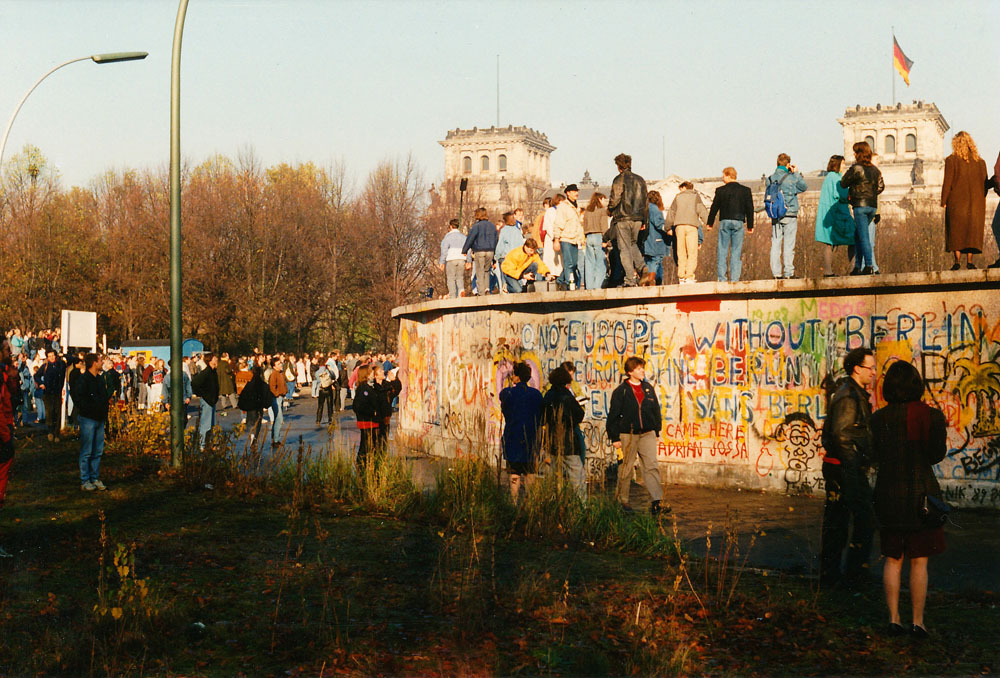Debat | From Iron Curtain to integration challenge
35 years of a unified Germany in the EU
| Activiteit van Duitsland Instituut Amsterdam |
|
|---|---|
| Datum: | dinsdag 29 oktober 2024 om 19:00 uur |
| Locatie: | Muziekgieterij, Kleine Zaal, Boschstraat 5, Maastricht |
| Informatie: | Voertaal: Engels. Inloop vanaf 18.30 uur. Aanmelden |
| Toegang: | Gratis |
Vijfendertig jaar na de val van de Berlijnse Muur staat Europa op een kruispunt. Duitsland, ooit een drijvende kracht achter de Europese eenheid, wordt nu geconfronteerd met vragen over zijn rol in de toekomst van de EU. Vertraagt Duitsland de Europese integratie? Tijdens deze avond in Maastricht gaan we hierover in gesprek met vooraanstaande Europa-deskundigen.
De voertaal is Engels.
Thirty-five years after the fall of the Berlin Wall, Europe stands at a crossroads. Once a driving force behind European unity, Germany now faces questions about its role in the EU’s future. While the Maastricht Treaty and the expansion of the EU in the 1990s and early 2000s marked a period of rapid integration, recent years have seen a notable slowdown. Economic challenges, political divergences, and the rise of Euroscepticism are testing the union’s cohesion. Traditionally, the Franco-German alliance has propelled Europe forward, but today, Germany’s cautious stance and the growing influence of far-right political forces raise critical questions about the direction of European integration.
Studio Europa Maastricht and the Duitsland Instituut Amsterdam (DIA) are organizing a public program to explore Germany’s evolving role in the EU and its impact on European unity. Join us on October 29 in Maastricht for a thought-provoking conversation with leading European experts: Aline Sierp (Maastricht University), Nynke van Verschuer (NRC) and Hanco Jürgens (DIA), moderated by POLITICO’s chief Europe correspondent based in Berlin, Matthew Karnitschnig. Together, we will try to answer the question: “Is Germany slowing down European integration?”
Professor Georgi Verbeeck (KU Leuven / Maastricht University) will begin the program with a brief lecture on the historical context of the Berlin Wall and its significance for German political culture and modern European history.
About the speakers
Georgi Verbeeck is Professor of History at the University of Leuven and Associate Professor of Political Culture at Maastricht University. He specializes in modern German history and the politics of history.
Aline Sierp is Associate Professor in European History & Memory Studies and Head of Department of the History Department at Maastricht University (NL). She holds a PhD in Comparative European Politics and History from the University of Siena (IT). Her research interests cover contested histories, memory politics, questions of identity and European integration.
Nynke van Verschuer is the Berlin correspondent for the Dutch daily newspaper NRC since 2021. Before moving to Germany, she worked as a book critic for the same publication.
Hanco Jürgens is a member of the academic staff at the Duitsland Instituut Amsterdam and a fellow at the Montesquieu Instituut. He teaches German and European history at the University of Amsterdam. Jürgens’ research focuses on the history of modern Germany in a European context. Currently, he focuses on the transformation of German society since the 1980s. He has published on a variety of topics, such as (the history of) Dutch-German relations, German EU-policy and the Franco-German relations.
Matthew Karnitschnig (moderator) is POLITICO’s chief Europe correspondent, based in Berlin. He joined the publication in 2015 from the Wall Street Journal, where he spent 15 years in a variety of positions as a reporter and editor in the U.S. and Europe.

